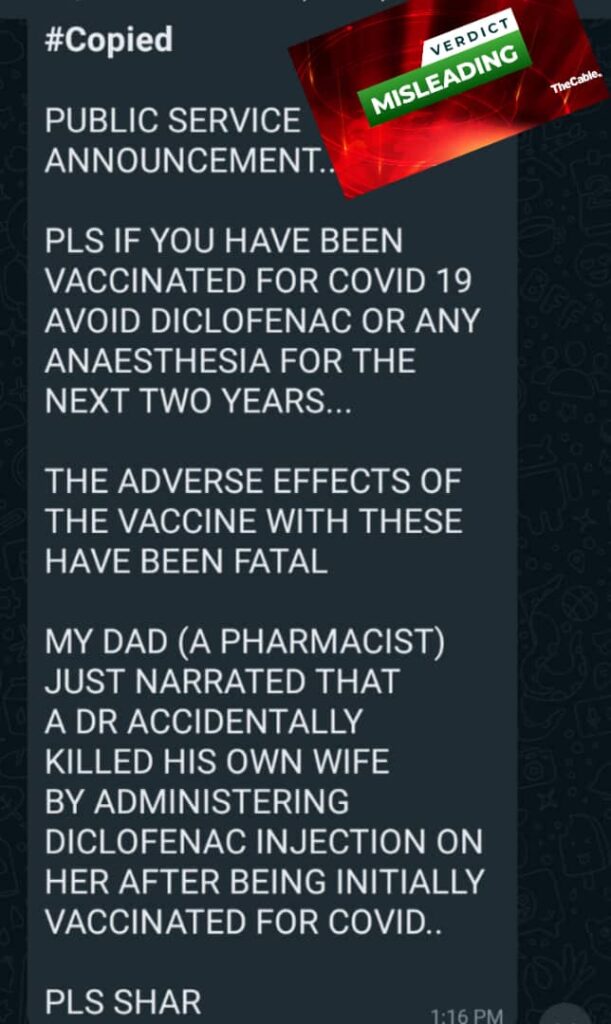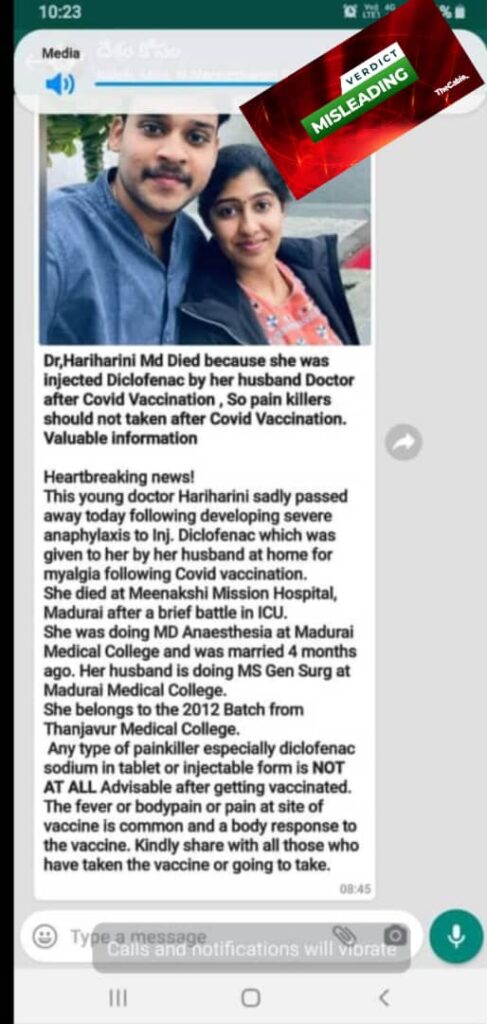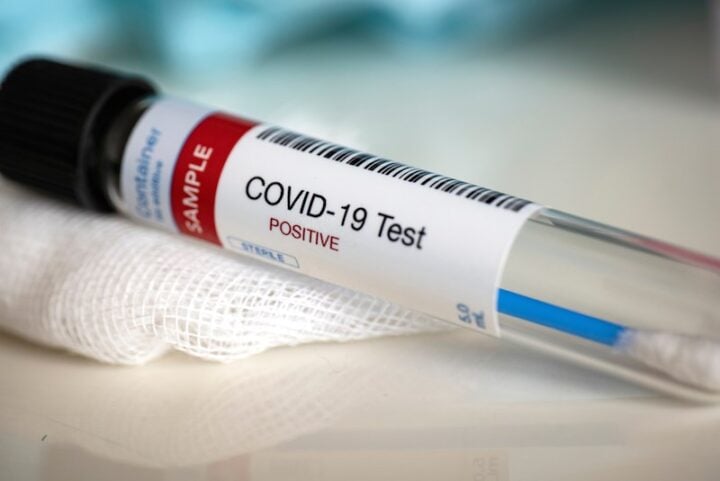A viral broadcast message on WhatsApp has claimed that taking diclofenac or anaesthetics for two years after COVID-19 vaccination has adverse effects or could even lead to death.
The viral broadcast, which has been shared multiple times among WhatsApp users in Nigeria, claimed that a pharmacist narrated how a doctor “accidentally killed” his wife by administering diclofenac injection on her after being vaccinated for COVID-19.
The post written in form of a public service announcement is part of the numerous COVID-19 misleading contents that have emerged on social media since the beginning of the pandemic.
“Pls if you have been vaccinated for covid 19 avoid diclofenac or any anaesthesia for the next two years. The adverse effects of the vaccine with these have been fatal,” the broadcast message reads.
Advertisement
“My dad (a pharmacist) just narrated that a dr accidentally killed his own wife by administering diclofenac injection on her after being initially vaccinated for covid.”

EXPLAINING THE CONCEPT
According to the UK National Health Service (NHS), diclofenac is a medicine that reduces swelling (inflammation) and pain. It belongs to the non-steroidal anti-inflammatory drugs (NSAIDs) category. NSAIDs are drugs that are commonly prescribed to reduce inflammation, high temperature and relieve pain. The UK NHS listed ibuprofen, naproxen, diclofenac, celecoxib, mefenamic acid, etoricoxib, and indomethacin as examples of NSAIDs.
Advertisement
Those with certain health conditions are advised to ask their doctors or pharmacists before taking diclofenac. Like other medications, diclofenac has side effects like upset stomach, nausea, heartburn, diarrhea, constipation, gas, headache, drowsiness, and dizziness.
However, medical experts have advised that it is safe when recommended by a pharmacist or doctor.
VERIFYING THE CLAIM
Although medical experts have certified COVID-19 vaccines safe for consumption, some people experience mild side effects after taking the jabs, while some do not.
Advertisement
According to the US Centers for Disease Control and Prevention (CDC), the possible side effects of COVID-19 vaccines are pain, redness, swelling, tiredness, headache, muscle pain, chills, fever and nausea. As a result, some people resort to the use of painkillers (NSAIDs) to relieve them of the pains.
Earlier this year, the use of NSAIDs after COVID-19 vaccination raised several concerns on whether the use of painkillers would reduce the efficacy of the vaccine or negatively affect the body systems.
However, the CDC does not recommend taking painkillers before a COVID-19 vaccination but advised that over-the-counter painkillers can be taken to relieve post-vaccination medications. The CDC also said that before taking the painkillers, people should talk to their doctors if they experience any pain and discomfort.
The commission on human medicines, in an advisory published on April 14, 2020, said “expert working group on coronavirus (COVID-19) has concluded that there is currently insufficient evidence to establish a link between the use of ibuprofen, or other non-steroidal anti-inflammatory drugs (NSAIDs), and susceptibility to contracting COVID-19 or the worsening of its symptoms.”
Advertisement
Speaking with TheCable, Segun Bankole, a medical expert at Alimosho General Hospital, Lagos state, said it is not true that taking diclofenac and anaesthesia after vaccination can lead to death, adding that some people usually develop some mild reactions after taking COVID-19 vaccine.
The medical expert said those who develop hot temperature after COVID-19 vaccine can take paracetamol, adding that in extreme cases, ibuprofen and diclofenac can be taken.
Advertisement
“That is a lie. If you take COVID-19 vaccine, the commonest reaction is that the patient develops high temperature for a few days or has pain at the site of injection,” Bankole said.
“That is a common reaction between 24 and 48 hours. Paracetamol can take care of it. In extreme cases, where paracetamol can’t take care of it, you can do ibuprofen or diclofenac. That can’t kill anybody.”
Advertisement
Narrating a personal experience, he said, “when I took my second jab and I was running temperature, I took a diclofenac tablet and I’m not dead yet.”

Speaking with TheCable, Oyewale Tomori, a professor of virology, said the claim that a vaccinated person died after taking diclofenac is not true, adding that there is no correlation between the person’s death and COVID-19 vaccine.
Advertisement
“Something must have killed the person. It can’t be the vaccine. First of all, the fact that the person got diclofenac injection meant that the person had something wrong before,” the professor said.
“I want to tell you a story; somebody went to get a COVID-19 vaccine. When he came out of the vaccination centre, he was knocked down by Okada (motorcycle) and he broke his leg. Was it the vaccine that broke his leg? A lot of people just associate anything with COVID-19 vaccine. Even when somebody dies after taking the vaccine, there is a need for so much investigation to confirm that what happened had a relationship with the vaccine the person received.”
“People can be sick for one thing or another — a slight headache — you can take paracetamol and there is no problem. We are different individuals. There are some people who will eat fish and their faces will start swelling. People are allergic to certain things and therefore the way you will react will be different from me.”
According to health desk, an initiative that provides evidence-based research on COVID-19, there is no scientific evidence demonstrating that taking diclofenac after receiving the COVID-19 vaccine causes any complications or death.
VERDICT
There is no sufficient evidence that the use of diclofenac or anaesthetics after taking COVID-19 vaccination can cause death. Therefore, the WhatsApp broadcast is misleading.
Add a comment



